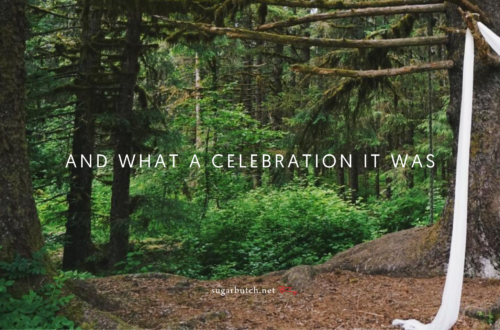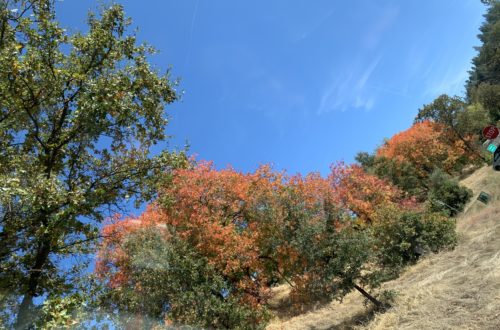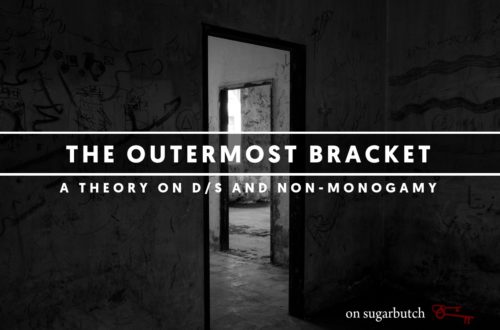On Friday, I sent a request for information from friends and acquaintances and smarty-pants folks in my life who I know have experience with polyamory and open relationships, as an attempt to mine my network for more insight and information about some of the difficulties of open relationships that Kristen and I have been going through lately. The interviews have been pouring in! I’ll be publishing them periodically in the next few weeks, and at the end of the series I’ll open it up for your input and thoughts on these questions too.
Open Relationship Mini Interview with Yarrow
Yarrow, sunflowerriver.org
I always feel like I should state my subject position when coming into this kind of dialogue, so, for full disclosure/context: I identify strongly as poly, and have been functioning that way since 1998. I’ve had exactly one monogamous relationship ever (though at the very outset, I didn’t have language adequate to describe my desires or lifestyle, besides “dating around”), and when we tried to open it up to polyamory, it didn’t go very well. That was 1998; a lot has happened since then. Presently, I have two long-term primary partners with whom I live in an intentional community (I’m married to one of them), and two friends-with-benefits relationships with other people. My partners also have other partners. This web changes regularly, in a highly organic fashion. Nobody has “veto” power over anybody else, and we all place a high value on communication and emotional integrity. We tend to describe ourselves as an organic poly network. There are lots and lots of ways to be poly in the world; this is what we do.
1. What insight about open relationships do you wish you had when you started?
I mostly wish I had had access to good role models, or any recognition that there is no single, one-size-fits-all, right way to do this. I knew very few other poly people when I began to recognize it in myself, and I developed all kinds of wrong ideas as a result. So: just because you’re dating someone, doesn’t mean you need to date the other people they’re dating. It also does not mean you need to love the people they love. It helps if you like them and you can all have dinner together, but it’s not required. This seems self-evident, but it’s not, and I see other people go through this as they move into polyamorous expression. Also: reality checks are vital, particularly with regard to one’s partners’ other partners. It is way too easy to tell yourself a story about what that person thinks and feels, to over-interpret casual actions or statements, to invest everything with excesses of meaning. And it’s very important to not do that. You want to know what they think or feel, ask them. And trust that they are honest with their response. Don’t try to “read between the lines.” Have integrity with your own responses to such things, engage in full disclosure (gently and tactfully, but with complete integrity), and other people will generally do the same.
Also: over-communication can be just as damaging as under-communication. Balance is important. Learning to identify when I am overwrought and will change my mind tomorrow, or feeling something too strongly to know what I will want the next day, was an incredibly important step towards functional polyamory. Another way to say that: sifting the apparent needs of the moment out from long-term needs is an extremely helpful step.
2. What has been the hardest thing about opening your relationship, and
how have you overcome that?
At first, when I was in a mono relationship opening to polyamory (about 14 years go) the absolute hardest thing was to be honest with myself about what I wanted. To have internal integrity. I believed strongly that I was supposed to want certain things: a single life-long love, that elevated my existance to a meaningful plane; a soul-deep connection with a single other individual that would permeate all aspects of daily life and make them extraordinary. (Culturally, we teach our children to want this. And I’m not saying it’s not out there, BUT: it’s very much not a one-size-fits-all solution to the idea of relationship; it doesn’t have to take place inside the context of externally-committed monogamy; and where it intersects with the abdication of personal responsibility, it can be completely unhealthy, and can create dangerously unrealistic expectations.) So, I was mired pretty deeply in an internal struggle with that paradigm. And I lied to myself that I wanted that level of daily-life-interweaving, instead of independence. And I lied to myself that I wanted to want only one partner. I lied to myself about what I wanted from that partner. Getting through that tangle took a couple years, and completely destroyed that relationship (I am very fortunate that we are still friends). The hardest part about it, was figuring out what I really did want, and then ACCEPTING that. Making it be okay to be who I am and want what I want. No matter what that looked like to the overculture. Figuring that out, and then being able and willing to communicate it to my partner, was earth-shatteringly difficult. But once that happened, and we recognized that we needed irreconcilable things in a partnership, we were able to move forward (by breaking up and letting each of us take our own paths), and each of us was able to grow emotionally and spiritually, to come into ourselves, much more fully. Getting past the self-deception was the most challenging thing.
3. What has been the best thing about your open relationship?
Self-actualization, and full actualization of each relationship I find myself in. Each new connection with another person can become whatever it is meant to become on the entire spectrum of friendship and intimacy. I am free to fall in love, and my partners are also free to do so. And we have each others’ full support in doing so, and in getting through hard times in relationships with each other or with others. Having several perspectives when something goes wrong is incredibly helpful; different people can offer fantastic insights into events and situations, and help the affected people see their way through difficult things. I have partners with whom my emotional relationship is profoundly deep, rich and complex, and others where our connection is more playful, and i get to have all of those things. Also, I get to *be* different things for different people; nobody around here has to be everything for anybody. If I really want something and it’s not going to happen in one relationship, it may come very naturally in another. I thrive on variety; this rich complexity satifies very deep needs in me. I am an independent agent who lives fully and deeply enmeshed in a strong, complex web of support, encouragement, and connectivity. I love everything about that.
4. Anything else you’d like to add?
I experience polyamory/monogamy as a type of orientation spectrum, not unlike gender or sexuality. This can be a really helpful way to think about it; some people are really wired to be happy one way or another, in a monogamous relationship only, or in open relatinships only, while lots of people live in the flexible middle ground somewhere, and could be happy with any of a number of relationship styles when things line up right. People’s relationship orientation can grow and change over time, just like their sexuality, gender orientation or gender presentation. Where a given individual falls on the spectrum at a given time is not something to attach value judgement to — you get a certain thread in the poly community that believes that polyamory is “more evolved” than monogamy. that’s bullshit. putting each other down to lift ourselves up only creates more division instead of creating understanding and community. there’s no right or wrong about wanting to be with a single partner or multiple partners, any more than there’s a right or wrong about being with a male or female or genderfluid partner.




Thank you so much for sharing. You’ve written so many things here that strike a chord with me. I also really appreciate your perspective on poly jot being “more evolved.” That always rubs me the wrong way. Lots to think about. Thank you again.
“People’s relationship orientation can grow and change over time, just like their sexuality, gender orientation or gender presentation.”
I love this. Accepting your fluidity in expressing your truthful self. Thanks :)